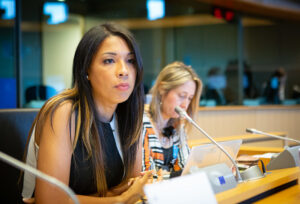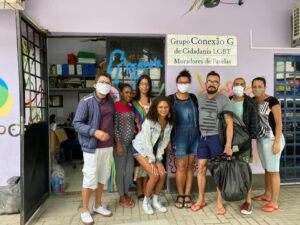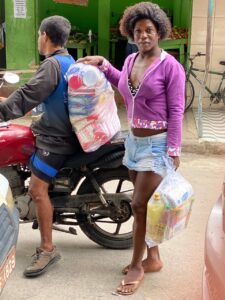Minds of the Movement
An ICNC blog on the people and power of civil resistance
by Sonja StojadinovicJune 18, 2020

Mariah Rafaela Silva, indigenous and LGBTQI rights activist in Brazil, during the Dec. 2019 EU-Mercosur summit in Brussels. Source: Flickr user GUE/NGL (CC BY-SA 2.0, unedited).
I met Mariah Rafaela Silva in December 2019, at an EU Parliament conference on the trade agreements negotiated and signed between the EU and Mercosur. Mariah spoke passionately about the nonviolent struggles of indigenous and LGBTQI people to protect their human rights in her native Brazil. The stakes are high: the Bolsonaro administration itself verbally attacks and has adopted discriminatory policies against these communities, and indigenous land has been destroyed by fire or stolen by the government and its oligarchic allies.
Mariah is a researcher and scholar at the Federal University in Rio de Janeiro who focuses on gender, sexuality and production of subjectivity through art history. She is also an activist with the Black Coalition for Rights in Rio de Janeiro. I interviewed her about how these movements of marginalized populations have been responding to the ongoing COVID-19 crisis and how they have been keeping their respective struggles alive all these years.
What are the main grievances of the LGBTQI community in Brazil, and have those grievances evolved since conservative president Bolsonaro became president in January 2019?

Grupo Conexão G de Cidadania LGBT de Favelas, with which Silva works. Source: Silva.
Silva: LGBTQI individuals in Brazil, particularly with trans identities, are among the most vulnerable groups here. Since Bolsonaro's election and the polarization of Brazilian society, violence against the LGBTQI population has worsened. The administration's fiery speeches against the LGBTQI population have functioned as a deliberate invitation for people to violate LGBTQI rights. Major complaints include physical attacks, name-calling and death threats. According to Gays of Bahia (GGB), the National Association of Travestists and Transexual (Antra), and the International Transgender Murder Monitoring Project, NGO groups that work on transgender issues in Brazil, the country has the most LGBTQI murders in the world.
Also, we’ve been the target of government attacks on sex education and pedagogies of diversity. The government censors artistic and cultural production (for example by banning gay films and comics last year), and issued threats to those who display homosexual affection or any form of sexual divergence.
Despite some recent advances, such as the Supreme Court vote to criminalize LGBTQIphobia, the guarantees of rights for these people are relatively recent; however, they have yet to be codified in Brazilian law.
What is the history of the LGBTQI movement for rights in Brazil? What were its initial demands?

Favela in Brazil where people received help from Silva's organization, Grupo Conexao. Source: Silva.
The LGBTQI movement in Brazil has a long history of steadfast resistance to repressive policies. Amid the military dictatorship’s violent repression of the gay community in the 1970s, activists raised awareness about their rights, published books and articles in tolerant press, engaged in construction of a collective identity, and began organizing in more formal groups. During the period of return to democracy in the late 1980s, the movement fought against the dictatorship-fueled stigma of HIV/AIDS, sexual perverts, and mental illness.
Initially the movement was built around the demands of middle-class gay men in university spaces. Over time, this trend has transformed via lesbian women's organizations and later, from 1992 on, via transvestite and transsexual participation in the movement. These actors started to demand that the government address violence against LGBTQI people, the HIV/AIDS crisis, and other policies. More recent demands have mostly come from trans activism.
What obstacles and challenges is the movement facing in their work to protect LGBTQI citizens in Brazil?
Currently, the main obstacle is the Bolsonaro government’s anti-LGBTQI discourse. Another major challenge for the movement in Brazil lies in its capacity to build a broader dialogue with the most conservative sectors of society. This means that we will have to look for strategies to implement forms of educational, cultural, health and rights promotion on a grassroots level and not rely on appeals to the judicial system.
Pivoting to another vulnerable but resisting group in Brazilian society with whom you work: How are the indigenous people and small agricultural land owners struggling to protect their lands after the disastrous fires in the Amazon last year?
Indigenous groups are among the most vulnerable in the COVID-19 crisis, with the nefarious persistence of land grabbers and the Bolsonaro government's ideology of deliberate deforestation of the Amazon rainforest.
These groups have taken preventive actions by locking down their lands to prevent access to people from outside. Likewise, indigenous leaders have demanded that the federal government structure the Brazilian health system so that their people have access to better services. Indigenous leaders organize regional seminars and informal public gatherings to share ideas, and also engage institutionally with political parties.
Indigenous groups are also forming alliances with other human rights actors, including the Quilombola movements, black movements and LGBTQI movements. Indigenous leader Ailton Krenak has written books and newspaper articles about the plight of indigenous communities and existing discrimination and oppression. Finally, social media has made it easier to organize creative, direct actions against deforestation, for example seed-planting protests.
How is the global COVID-19 crisis affecting both the LGBTQI and indigenous rights movements?
The movements’ efforts to combat COVID-19 have taken place entirely separate from or even in opposition to the Brazilian government. They show how creative and resilient bottom-up opposition is.
Several grassroots actors have been coming together to inform people in the favelas and indigenous lands about the Coronavirus. They deliver groceries and reach out to marginalized peoples to ensure other basic needs. These local groups are revising their budgets and engagement strategies to prioritize stopping the spread of the virus, stepping in where the government has fallen short.
In the favela da Maré, I am part of a local group that has been crowdfunding in order to sustain our mutual support actions to meet basic community needs amid the COVID-19 crisis.
We have been recruiting new volunteers to deliver food and equipment all over the favelas north of Rio de Janeiro. We train people to be civic educators about the Coronavirus in their communities. One creative tactic we have used is blasting information from car stereos to the local population about the importance of wearing a mask.
Our mutual support always carries a message about our political cause. In parallel with our community efforts, we have been broadcasting live on Facebook and other social media to protest the abuses and neglect of the government. We’ve had several online petitions calling on the government to do their job to combat the pandemic, and as always, to combat violence against marginalized populations in Brazil.

Sonja Stojadinovic
Sonja Stojadinovic is an MA student in Southeast European Studies at the University of Graz, Austria. She holds bachelor and master degrees in political science and international relations, both obtained on the Faculty of Law, Skopje, University of St. Cyril and Methodius, Republic of North Macedonia. She is also an activist and well-known columnist for North Macedonian daily newspapers and regional political web sites.
Read More